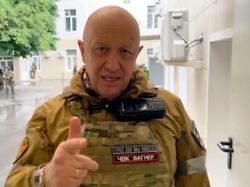For paying large sums of money
Russian TV presenter: Prigozhin went nuts
7/3/2023 1:21 am
The Kremlin-affiliated journalist Kissilev claims on Russian state television: The Wagner Group has received state funds amounting to 858 billion rubles. The head of the Wagner mercenary group is said to have lost his grip on the ground. The feeling of “being able to afford anything” is not new.
A moderator on Russian state television has accused Wagner boss Yevgeny Prigozchin of having lost his grip on reality after receiving billions in public funds. “Prigozhin snapped because of the large sums of money,” said Kremlin-affiliated journalist Dmitry Kissilev on his weekly show. “He believed that he could rebel against the Russian Defense Ministry as well as against the state and the president himself,” said Kissilev.
Prigozhin has had the feeling that he can “allow himself to do anything” since his mercenary troops were deployed in Syria and Africa. It “intensified” after Wagner mercenaries captured the Ukrainian cities of Soledar and Bakhmut earlier this year, he added. Kissilev is one of the most well-known faces of Russian propaganda.
The moderator explained that the Wagner Group had received state funds amounting to 858 billion rubles (around 8.8 billion euros) – without submitting any evidence for the information. A few days earlier, Russian President Vladimir Putin had admitted for the first time that the Wagner troupe had been fully equipped by the Russian state. Between May 2022 and May 2023, the mercenary group received more than 86 billion rubles from the state, Putin said.
Insurgents got away with it
Under Russian law, private mercenary groups are prohibited. While the US and the EU imposed sanctions on the Wagner Group, Prigozhin operated in the background for a long time. It was only after the start of the Russian invasion of Ukraine that he came into the limelight. Prigozhin had a free hand to recruit criminals for his mercenary service in Russian prisons. Russian MPs approved legislation introducing longer prison sentences for critics of “volunteer groups” like Wagner. Prigozhin repeatedly accused the Russian military leadership of “stealing” the victories of its fighters in eastern Ukraine and blamed Moscow’s “monstrous bureaucracy” for the slow military successes.
The newspaper “Wall Street Journal” reported on Sunday that the headquarters of the Wagner group in St. Petersburg had been searched by agents for evidence against Prigozhin. Headquarters announced on Telegram on Saturday that it was moving but would remain operational in a “new format”.
On Saturday last week, the mercenaries occupied the Russian army headquarters in Rostov-on-Don in south-western Russia for several hours and then advanced towards Moscow. The uprising ended the same evening with an agreement under which Prigozhin went into exile in Belarus. The insurgents escaped with impunity, but the future of the mercenary force seems uncertain.
Is the uprising a sign that Putin is weakening?
News sites related to the company were blocked in Russia this week. Prigozhin has not spoken publicly since Monday. On Sunday, Kissilyov dismissed the statement that the Wagner mercenaries were the most effective Russian force, arguing that it took the mercenaries “225 days” to take Bakhmut while it took the regular army “70 days” to capture Mariupol.
Political observers took Prigozhin’s attempted uprising as a sign of Putin’s weakening. However, representatives of the government and propaganda in Moscow insist that the population has rallied behind Putin. On Sunday, Vyacheslav Volodin, Speaker of the Russian House of Commons, said that Putin had actually emerged from “this very difficult situation” even stronger. “He did everything to prevent bloodshed,” Volodin said on his Telegram messenger channel. “If people like Putin had been at the helm in 1917 and 1991, there would have been no revolution and no collapse of the USSR”; he explained.
